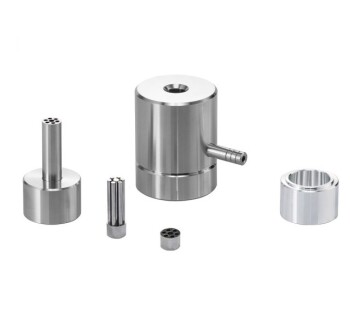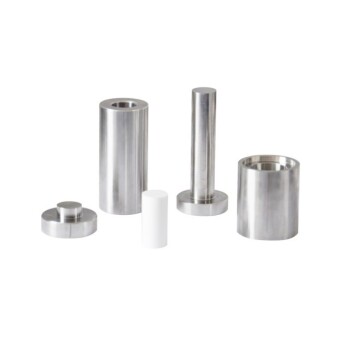Heated lab presses offer a critical advantage in pharmaceutical production by using a combination of controlled heat and pressure to transform powders into structurally superior tablets. This process enhances the bonding between drug particles and excipients, which directly results in more uniform drug distribution, highly accurate dosages, consistent drug release properties, and significantly improved mechanical strength in the final pill.
The true value of a heated lab press is not just in compressing powder, but in its ability to precisely engineer the final physical and chemical properties of a tablet. This control is fundamental to ensuring a drug's safety, effectiveness, and reliability from the lab to the patient.

The Science of Tablet Formation: Why Heat Matters
A heated lab press fundamentally changes how drug powders and binding agents interact during compression. The addition of thermal energy creates a more robust and consistent final product compared to what can be achieved with pressure alone.
Enhancing Particle Bonding
At a microscopic level, heat softens the materials in the powder blend, including the active pharmaceutical ingredient (API) and the excipients. This softening allows the particles to deform and fuse together more effectively under pressure, creating a solid, tightly integrated tablet matrix. Cold pressing relies solely on mechanical force to lock particles together, which can result in weaker bonds.
Achieving Homogeneous Drug Distribution
Weak particle bonding can lead to segregation, where the API separates from the excipients during or after compression. The superior fusion created by a heated press locks the API in place, ensuring it is homogeneously distributed throughout the tablet. This is a non-negotiable requirement for accurate dosing.
Ensuring Mechanical Strength and Durability
The strong intermolecular bonds formed during heated compression result in tablets with high mechanical strength. These pills are far less likely to chip, crack, or break during the rigors of manufacturing, packaging, and transportation, ensuring the product reaches the patient intact.
Impact on Pharmaceutical Performance and Quality
The physical structure of a tablet, determined during its formation, has a direct impact on its therapeutic performance and the reliability of quality control testing. Heated presses offer a level of control that is essential for modern drug development.
Controlling Drug Release Profiles
The density and porosity of a tablet dictate how quickly it dissolves in the body. By precisely controlling heat and pressure, formulators can engineer tablets for specific dissolution profiles, such as rapid, immediate release or slow, controlled release over many hours. This control is critical for optimizing a drug's therapeutic effect.
Improving Bioavailability
In some formulations, the heated press process can help encapsulate the API within a polymer matrix. This can protect the drug from degradation in the stomach or fine-tune where it is absorbed in the digestive tract, thereby enhancing its bioavailability—the amount of drug that successfully enters the bloodstream.
Creating Uniform Samples for Critical Testing
In pharmaceutical research and development, consistency is paramount. Heated lab presses are used to create perfectly uniform pellets from powdered drugs for essential tests like dissolution analysis, stability studies, and bioavailability assessments. The repeatable nature of the press ensures that test results are accurate and reliable, which is a requirement for regulatory submissions.
Understanding the Trade-offs and Nuances
While powerful, the benefits of a heated press are dependent on its correct application. Understanding the potential limitations is key to leveraging its full potential.
Risk of Thermal Degradation
The most significant consideration is the thermal stability of your API and excipients. Applying excessive heat can degrade a heat-sensitive drug, rendering it ineffective or even harmful. It is crucial to determine the safe temperature window for your specific formulation.
The Importance of Precise Control
The advantages described are only realized through precise and repeatable control over temperature, pressure, and dwell time. A high-quality press with reliable controls is necessary; inconsistent parameters will produce inconsistent tablets, defeating the primary purpose of the equipment.
Application-Specific Tooling
The final shape, thickness, and even embossing of a tablet are determined by the die and punch set used in the press. Selecting the appropriate tooling is just as important as controlling the press parameters for achieving the desired final product for either production or testing.
Making the Right Choice for Your Goal
A heated lab press is a versatile tool, but its primary function shifts depending on your specific objective.
- If your primary focus is R&D and formulation development: Use the press to test different excipients and explore how varying heat and pressure impact the tablet's hardness and drug release profile.
- If your primary focus is quality control: Leverage the press to produce highly standardized pellets for dissolution testing and stability studies, ensuring your data is reliable and repeatable.
- If your primary focus is small-scale manufacturing: Prioritize its ability to create mechanically robust tablets with uniform dosage, especially when working with complex controlled-release formulations.
Ultimately, mastering the use of a heated lab press gives you direct control over a tablet's fundamental properties, turning pharmaceutical science into a reliable and repeatable process.
Summary Table:
| Advantage | Description |
|---|---|
| Enhanced Particle Bonding | Heat softens materials for stronger fusion, improving tablet integrity. |
| Homogeneous Drug Distribution | Ensures uniform API spread for accurate dosages. |
| Improved Mechanical Strength | Reduces chipping and breaking during handling and transport. |
| Controlled Drug Release | Allows engineering of dissolution profiles for optimal therapeutic effects. |
| Increased Bioavailability | Can enhance drug absorption and protect against degradation. |
| Uniform Sample Creation | Produces consistent pellets for reliable testing and regulatory compliance. |
Ready to elevate your pharmaceutical production with precision and reliability? KINTEK specializes in high-quality lab press machines, including automatic lab presses, isostatic presses, and heated lab presses, designed to meet the rigorous demands of laboratories. Our equipment ensures superior control over heat and pressure, delivering uniform tablets, enhanced drug performance, and consistent results for R&D, quality control, and small-scale manufacturing. Don't compromise on quality—contact us today to discover how KINTEK can support your laboratory needs and drive your success!
Visual Guide

Related Products
- Automatic High Temperature Heated Hydraulic Press Machine with Heated Plates for Lab
- Automatic Heated Hydraulic Press Machine with Hot Plates for Laboratory
- Lab Heat Press Special Mold
- Laboratory Manual Heated Hydraulic Press Machine with Hot Plates
- Heated Hydraulic Press Machine with Heated Plates for Vacuum Box Laboratory Hot Press
People Also Ask
- Why is a hydraulic heat press critical in research and industry? Unlock Precision for Superior Results
- How does using a hydraulic hot press at different temperatures affect the final microstructure of a PVDF film? Achieve Perfect Porosity or Density
- Why is a heated hydraulic press considered a critical tool in research and production environments? Unlock Precision and Efficiency in Material Processing
- What role does a heated hydraulic press play in powder compaction? Achieve Precise Material Control for Labs
- What is the role of a hydraulic press with heating capabilities in constructing the interface for Li/LLZO/Li symmetric cells? Enable Seamless Solid-State Battery Assembly



















